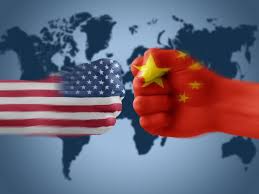
There are very little details of the so called 90 day truce in the US-China trade war along with concerns of whether China would ultimately cow down to US trade demands. But that has not stopped the Trump administration from celebrating it as a significant breakthrough.
"This is just an enormous, enormous event," Larry Kudlow, United States President Donald Trump's top economic adviser, said on Monday about the trade war truce agreed upon between Trump and Chinese President Xi Jingping at the G20 summit in the Argentine capital of Buenos Aires. "This one covers so much ground in some detail, we've never seen this before."
There is however a sense of scepticism among economists about the possibility of what can be done within just 90 days.
"The actual amount of concrete progress made at this meeting appears to have been quite limited," Alec Phillips and other economists at Goldman Sachs wrote in a research note.
The agreement between the two leaders in Buenos Aeries entailed Trump postponing the scheduled increase of the current rates on Chinese products from 10 per cent to 25 per cent from January 1, 2019. In the mean time, the two sides would hold discussions about US allegations against China over its trade practices – specifically the allegation of China usurping American technology through joint ventures and the violation of intellectual property rights.
The White House said that as a reciprocating gesture to the concession by the US, China has agreed to increase more import of farm, energy and industrial goods from the US.
However, according to large section of economists, the stand of the two parties on the largest of the issues between them is very different which include issues related to China providing subsidies to strategic Chinese industries and the forced transfer of technology of foreign firms through joint ventures with Chinese partners and alleged theft of intellectual property.
"Ninety days is very little time to fix these perennial issues," said Bill Adams, senior economist at PNC.
"It's impossible for China to cancel its industry policies or major industry and technology development plans," said economist Cui Fan of the University of International Business and Economics in Beijing.
Despite the misgivings, economists are relieved that at least there has been a temporary halt in the trade war and the scheduled tariff hikes because of the Trump-Xi meeting. This is because in addition to the increase in the tariff rates, Trump has also threatened to impose import tariffs on the rest of the $267 billion of Chinese goods that are imported into the US. Such a measure would have enhanced the prices of many consumer commodities in the US including things such as smartphones, clothes and toys.
Trump's willingness to reach a truce was potentially triggered by the recent turmoil in the market, said Megan Greene, chief economist at Manulife. "We are no longer in the same buoyant economic or markets environment that we enjoyed earlier this year when threats of tariffs against China were first made," she said.
(Source:www.abc.com)
"This is just an enormous, enormous event," Larry Kudlow, United States President Donald Trump's top economic adviser, said on Monday about the trade war truce agreed upon between Trump and Chinese President Xi Jingping at the G20 summit in the Argentine capital of Buenos Aires. "This one covers so much ground in some detail, we've never seen this before."
There is however a sense of scepticism among economists about the possibility of what can be done within just 90 days.
"The actual amount of concrete progress made at this meeting appears to have been quite limited," Alec Phillips and other economists at Goldman Sachs wrote in a research note.
The agreement between the two leaders in Buenos Aeries entailed Trump postponing the scheduled increase of the current rates on Chinese products from 10 per cent to 25 per cent from January 1, 2019. In the mean time, the two sides would hold discussions about US allegations against China over its trade practices – specifically the allegation of China usurping American technology through joint ventures and the violation of intellectual property rights.
The White House said that as a reciprocating gesture to the concession by the US, China has agreed to increase more import of farm, energy and industrial goods from the US.
However, according to large section of economists, the stand of the two parties on the largest of the issues between them is very different which include issues related to China providing subsidies to strategic Chinese industries and the forced transfer of technology of foreign firms through joint ventures with Chinese partners and alleged theft of intellectual property.
"Ninety days is very little time to fix these perennial issues," said Bill Adams, senior economist at PNC.
"It's impossible for China to cancel its industry policies or major industry and technology development plans," said economist Cui Fan of the University of International Business and Economics in Beijing.
Despite the misgivings, economists are relieved that at least there has been a temporary halt in the trade war and the scheduled tariff hikes because of the Trump-Xi meeting. This is because in addition to the increase in the tariff rates, Trump has also threatened to impose import tariffs on the rest of the $267 billion of Chinese goods that are imported into the US. Such a measure would have enhanced the prices of many consumer commodities in the US including things such as smartphones, clothes and toys.
Trump's willingness to reach a truce was potentially triggered by the recent turmoil in the market, said Megan Greene, chief economist at Manulife. "We are no longer in the same buoyant economic or markets environment that we enjoyed earlier this year when threats of tariffs against China were first made," she said.
(Source:www.abc.com)





